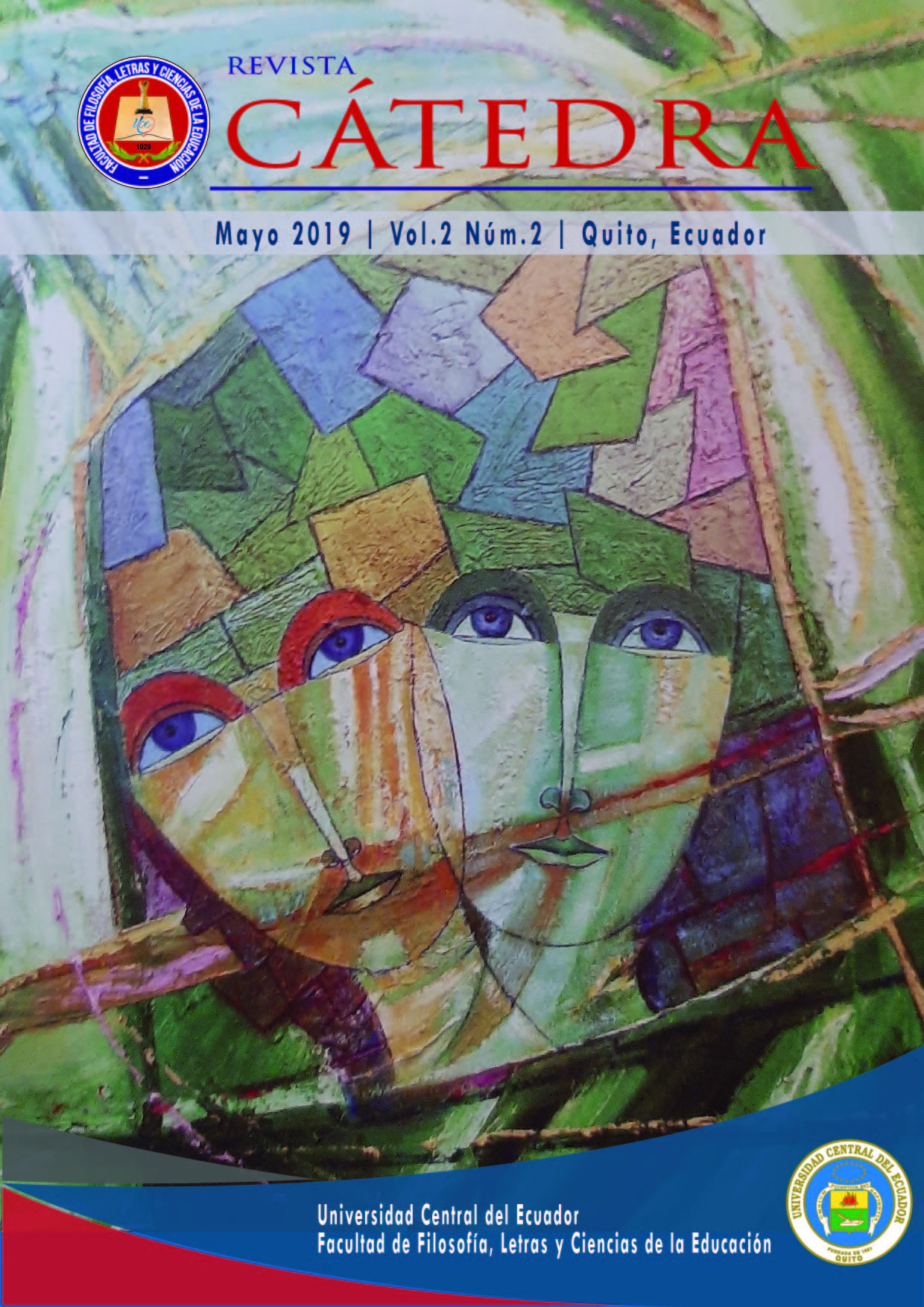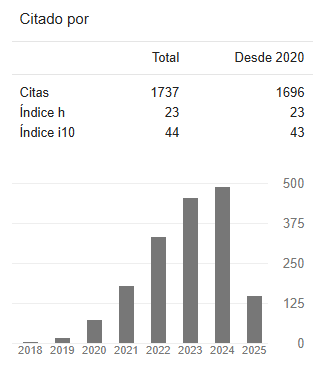Virtuousness profiles in school organizations in relations to psychological well-being levels in Ecuadorian adolescents
DOI:
https://doi.org/10.29166/catedra.v2i2.1594Keywords:
adolescence, positive Psychology, psychological well-being, school organizations, virtuousnessAbstract
The purpose of this study was to analyze the relationship between perceived virtues in positive school organizations and levels of well-being in adolecents; and, establish profiles of positive or virtuous school organizations considering, on the one hand, the gender and type of funding and, on the other, the levels of psychological well-being present in Ecuadorian adolescents. The research is justified by the need to generate spaces and strategies for socialization and learning that enhance the integral development of boys and girls and their lasting well-being in contexts influenced by instantaneous pleasure and high intensity. For the study, a sample of 550 students (51.7% men) was considered. The research applied two instruments validated to Ecuadorian contexts: the scale of perceived virtuousness in school organizations and the scale of psychological well-being in adolescents. As a result of the statistical analysis, a moderate correlation was observed between the study variables. Next, and in order to enhance the analysis, a cluster analysis of average k and an analysis of variance (ANOVA) of one factor were carried out to establish profiles of psychological well-being in adolescents according to the level of virtuosity perceived in school organizations. The aforementioned analysis gave rise to three levels of school organizations (virtuous, in transit to virtuousness and little virtuousness) that interacted in their order with three levels of psychological well-being (strengthened, under construction and vulnerable). Finally, in the section conclusions, specific strategies were formulated to generate virtuous organizations linked with better levels of well-being in students.
Downloads
References
Barcelata, B. y Rivas, G. (2016). Bienestar psicológico y satisfacción vital en adolescentes mexicanos tempranos y medios. Revista Costarricense de Psicología. Julio – Diciembre, volumen 35, número 2, 119 – 137. ISNN 0257-1439.
Cameron, K. S. (2012). Virtuousness and performance: a productive partnership. Execitive white paper series. Michigan Ross Scholl of Business.
Cameron, K., Mora, C., Leutscher, T. y Calarco, M. (2011). Effects of Positive Practices on Organizational Efectiveness. The Journal of Applied Behavioral Science XX(X) 1– 3.
Castro-Solano, A. (2009). El bienestar psicológico: cuatro décadas de progreso. Revista Interuniversitaria de Formación del Profesorado, 23 (3), 43-72.
Castro-Solano, A. (2010). Fundamentos de Psicología Positiva. Paidós: Buenos Aires.
Castro-Solano, A. (2011). Las rutas de acceso al bienestar. Relaciones entre bienestar hedónico y eudaemónico. Un estudio en población argentina. Revista Iberoamericana de Diagnóstico y Evaluación. vol. 1, núm. 31, pp. 37-57.
Castro-Solano, A. (2012). La Psicología Positiva en América Latina. Desarrollos y perspectiva. PSIENCIA, Revista Latinoamericana de Ciencia Psicológica, 4 (2), 108 – 118.
Castro-Solano, A. y Casullo, M. M. (2001). Evaluación del bienestar psicológico en estudiantes adolescentes argentinos. Revista de Psicología. Lima, Universidad Católica del Perú, XVIII (2), 35 – 68.
Casullo, M. M. (2002). Evaluación del Bienestar Psicológico en Iberoamérica. Buenos Aires: Paidós.
Casullo, M. M., y Castro-Solano, A. (2000). El significado de bienestar en estudiantes adolescentes. Revista Iberoamericana de Diagnóstico y Evaluación – e Avaliação Psicológica, 12(2), 57-70.
Cohen, J. (1988). Statistical power analysis for the behavioral sciences. (2.ª Ed), Erlbaum, Hillsdale, NJ.
Diener, E., Suh, E.M., Lucas, R.E. & Smith, H.L. (1999). Subjective well-being: Three decades of progress. Psychological Bulletin, 125, 276-302.
Fondo de Naciones Unidas para la Infancia (UNICEF). (2011). La adolescencia una época de oportunidades. Fondo de las Naciones Unidas para la infancia. New York.
González, S. y Rivera, M. (2016). Efectos del apoyo psicosocial, resiliencia y competencia social en el bienestar psicológico de adolescentes de sectores vulnerables, con eventos de vida estresantes. En Gaxiola, J. & Palomar, J. (coordinadores). El bienestar psicológico, una mirada desde Latinoamérica, 31-60. Universidad de Sonora. Qartuppi. Primera edición. Hermosillo, México.
Güemes-Hidalgo, M., Ceñal González, M. e Hidalgo-Vicario, M. (2017). Pubertad y adolescencia. Adolescere. Revista de Formación Continuada de la Sociedad Española de Medicina de la Adolescencia. Volumen V. Enero-Febrero 2017. No 1.
Jiménez, V. (2014). Psicología contemporánea básica y aplicada. Psicología Positiva. Ediciones Pirámide. Capítulo 21, 621-645.
Lupano-Perugini, M. L. (2017). Virtudes organizacionales, performance y satisfacción laboral. Diferencias según variables individuales y organizacionales en empleados argentinos. Psicodebate Vol. 17 No 1 ISSN: 1515–2251 e-ISSN: 2451-6600, 35–50 http://dx.doi.org/10.18682/pd.v17i1.637
Lupano-Perugini, M. L. y Castro-Solano, A. (2010). Psicología Positiva: análisis desde su surgimiento. Cienc. Psicol. [online]. vol.4, n.1, pp.43-56. ISSN 1688-4221.
Lupano-Perugini, M. L. y Castro-Solano, A. (2018). Influencia de las virtudes organizacionales sobre la performance laboral. Un estudio en organizaciones argentinas. Centro Interamericano de Investigaciones Psicológicas y Ciencias Afines (CIIPCA), volumen 35.
Ministerio de Educación del Ecuador (2016). Modelo de Funcionamiento de los Departamentos de Consejería Estudiantil. Quito-Ecuador
Ministerio de Educación del Ecuador (2017). Manual para la implementación y evaluación de los estándares de calidad educativa: gestión escolar, desempeño profesional directivo y desempeño profesional docente. Subsecretaría de Fundamentos Educativos. Dirección Nacional de Estándares Educativos. Quito, Ecuador. ISBN: 978-9942-22-234-3
Navarro-Pérez, J., Pérez-Cosín, J., y Perpiñán, S. (2015). El proceso de socialización de los adolescentes postmodernos: entre la inclusión y el riesgo. Recomendaciones para una ciudadanía sostenible. Pedagogía Social. Revista Interuniversitaria, (25), 143-170.
Nelson, D., y Cooper, C. (2007). Positive organizational behavior: Accentuating the positive at work. Thousand oaks, CA: Sage.
Organización Mundial de la Salud. (2006). Constitución de la Organización Mundial de la Salud. Documentos básicos, suplemento de la 45a edición.
Palomera, M. (2017). Psicología Positiva en la Escuela: Un Cambio con Raíces Profundas. Papeles del Psicólogo, 38 (1), 67-71. Recuperado de http://www.papelesdelpsicologo.es/pdf/2823.pdf
Páramo, M., Straniero, C., García, C., Torrecilla, N., y Escalante, E. (2012). Bienestar psicológico, estilos de personalidad y objetivos de vida en estudiantes universitarios. Pensamiento Psicológico, 10 (1).
Peterson, C. (2006). A primer in positive psychology. New York, NY: Oxford University Press. ISBN 9780195188332.
Ryff, C. (1989). Happiness is everything, or is it? Exploration son the meaning of psychological well- being. Journal of Personality and Social Psychology, 57 (6), 1069- 1081.
Romero-Carrasco, A. y Brustad, R. y García Mas, A. (2007). Bienestar psicológico y su uso en la psicología del ejercicio, la actividad física y el deporte. Revista Iberoamericana de Psicología del Ejercicio y el Deporte, 2 (2), 31-52.
Salanova, M., Llorens, S. (2016). Hacia una psicología positiva aplicada. Papeles del Psicólogo. Psychologist Papers, Vol. 37(3), pp. 161-164.
Salanova, M., Llorens, S. y Martínez, I. (2016). Aportaciones desde la Psicología Organizacional Positiva para desarrollar organizaciones saludables y resilientes. Papeles del Psicólogo, vol. 37 (39), pp. 137-184.
Seligman, M. E. P. (2003). Positive psychology. Fundamental assumptions. American Psychologist, 126-127.
Seligman, M. E. P., Steen, T. A., Park, N., & Peterson, C.
(2005). Positive psychology progress: Empirical validation of interventions. American Psychologist, 60(5), 410-421.
Seligman, M. E. P., Steen, T. A., Park, N., & Peterson, C. (2005). Positive psychology progress: Empirical validation of interventions. American Psychologist, 60(5), 410-421.
Seligman, M. E. P., Steen, T. A., Park, N., & Peterson, C. (2005). Positive psychology progress: Empirical
validation of interventions. American Psychologist, 60(5), 410-421.Seligman, M. E. P., Steen, T. A., Park, N., & Peterson, C. (2005). Positive psychology progress: Empirical
validation of interventions. American Psychologist, 60(5), 410-421.
Seligman, M. E. P., Steen, T. A., Park, N., Paterson, C. (2005). Positive psychology progress: Empirical validation of interventions. Fundamental assumptions. American Psychologist, 60 (5), 410-421.
Seligman, M. E. P. y Csikszentmihalyi, M. (2000). Positive psychology: An introduction. American Psychologist, 55, 5-14.
Seligman, M. E. P., Steen, T. A., Park, N., & Peterson, C. (2005). Positive psychology progress: Empirical
validation of interventions. American Psychologist, 60(5), 410-421.
Seligman, M. E. P., Steen, T. A., Park, N., & Peterson, C. (2005). Positive psychology progress: Empirical
validation of interventions. American Psychologist, 60(5), 410-421.
Seligman, M. E. P., Steen, T. A., Park, N., & Peterson, C. (2005). Positive psychology progress: Empirical
validation of interventions. American Psychologist, 60(5), 410-421.
Unda-Villafuerte, F. (2018). Virtuosidad percibida en organizaciones escolares, bienestar psicológico en adolescentes y liderazgo auténtico en docentes. Universidad de Palermo. Tesis doctoral. Repositorio.
Downloads
Published
Versions
- 2020-09-03 (2)
- 2019-05-29 (1)









